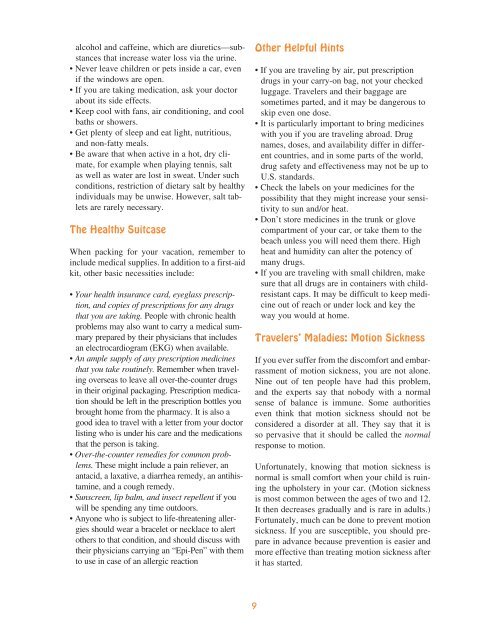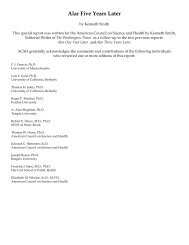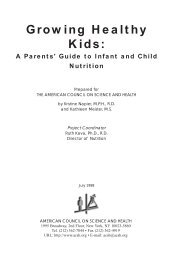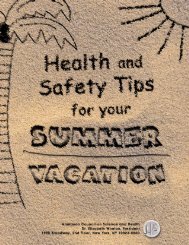Health and Safety Tips for Your Summer Vacation (Update 2010)
Health and Safety Tips for Your Summer Vacation (Update 2010)
Health and Safety Tips for Your Summer Vacation (Update 2010)
You also want an ePaper? Increase the reach of your titles
YUMPU automatically turns print PDFs into web optimized ePapers that Google loves.
alcohol <strong>and</strong> caffeine, which are diuretics—substances<br />
that increase water loss via the urine.<br />
• Never leave children or pets inside a car, even<br />
if the windows are open.<br />
• If you are taking medication, ask your doctor<br />
about its side effects.<br />
• Keep cool with fans, air conditioning, <strong>and</strong> cool<br />
baths or showers.<br />
• Get plenty of sleep <strong>and</strong> eat light, nutritious,<br />
<strong>and</strong> non-fatty meals.<br />
• Be aware that when active in a hot, dry climate,<br />
<strong>for</strong> example when playing tennis, salt<br />
as well as water are lost in sweat. Under such<br />
conditions, restriction of dietary salt by healthy<br />
individuals may be unwise. However, salt tablets<br />
are rarely necessary.<br />
The <strong>Health</strong>y Suitcase<br />
When packing <strong>for</strong> your vacation, remember to<br />
include medical supplies. In addition to a first-aid<br />
kit, other basic necessities include:<br />
• <strong>Your</strong> health insurance card, eyeglass prescription,<br />
<strong>and</strong> copies of prescriptions <strong>for</strong> any drugs<br />
that you are taking. People with chronic health<br />
problems may also want to carry a medical summary<br />
prepared by their physicians that includes<br />
an electrocardiogram (EKG) when available.<br />
• An ample supply of any prescription medicines<br />
that you take routinely. Remember when traveling<br />
overseas to leave all over-the-counter drugs<br />
in their original packaging. Prescription medication<br />
should be left in the prescription bottles you<br />
brought home from the pharmacy. It is also a<br />
good idea to travel with a letter from your doctor<br />
listing who is under his care <strong>and</strong> the medications<br />
that the person is taking.<br />
• Over-the-counter remedies <strong>for</strong> common problems.<br />
These might include a pain reliever, an<br />
antacid, a laxative, a diarrhea remedy, an antihistamine,<br />
<strong>and</strong> a cough remedy.<br />
• Sunscreen, lip balm, <strong>and</strong> insect repellent if you<br />
will be spending any time outdoors.<br />
• Anyone who is subject to life-threatening allergies<br />
should wear a bracelet or necklace to alert<br />
others to that condition, <strong>and</strong> should discuss with<br />
their physicians carrying an “Epi-Pen” with them<br />
to use in case of an allergic reaction<br />
Other Helpful Hints<br />
• If you are traveling by air, put prescription<br />
drugs in your carry-on bag, not your checked<br />
luggage. Travelers <strong>and</strong> their baggage are<br />
sometimes parted, <strong>and</strong> it may be dangerous to<br />
skip even one dose.<br />
• It is particularly important to bring medicines<br />
with you if you are traveling abroad. Drug<br />
names, doses, <strong>and</strong> availability differ in different<br />
countries, <strong>and</strong> in some parts of the world,<br />
drug safety <strong>and</strong> effectiveness may not be up to<br />
U.S. st<strong>and</strong>ards.<br />
• Check the labels on your medicines <strong>for</strong> the<br />
possibility that they might increase your sensitivity<br />
to sun <strong>and</strong>/or heat.<br />
• Don’t store medicines in the trunk or glove<br />
compartment of your car, or take them to the<br />
beach unless you will need them there. High<br />
heat <strong>and</strong> humidity can alter the potency of<br />
many drugs.<br />
• If you are traveling with small children, make<br />
sure that all drugs are in containers with childresistant<br />
caps. It may be difficult to keep medicine<br />
out of reach or under lock <strong>and</strong> key the<br />
way you would at home.<br />
Travelers’ Maladies: Motion Sickness<br />
If you ever suffer from the discom<strong>for</strong>t <strong>and</strong> embarrassment<br />
of motion sickness, you are not alone.<br />
Nine out of ten people have had this problem,<br />
<strong>and</strong> the experts say that nobody with a normal<br />
sense of balance is immune. Some authorities<br />
even think that motion sickness should not be<br />
considered a disorder at all. They say that it is<br />
so pervasive that it should be called the normal<br />
response to motion.<br />
Un<strong>for</strong>tunately, knowing that motion sickness is<br />
normal is small com<strong>for</strong>t when your child is ruining<br />
the upholstery in your car. (Motion sickness<br />
is most common between the ages of two <strong>and</strong> 12.<br />
It then decreases gradually <strong>and</strong> is rare in adults.)<br />
Fortunately, much can be done to prevent motion<br />
sickness. If you are susceptible, you should prepare<br />
in advance because prevention is easier <strong>and</strong><br />
more effective than treating motion sickness after<br />
it has started.<br />
9










